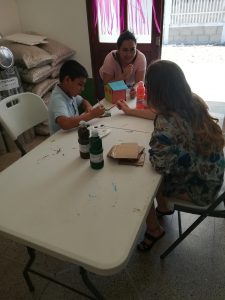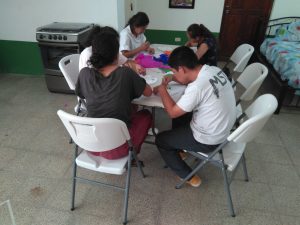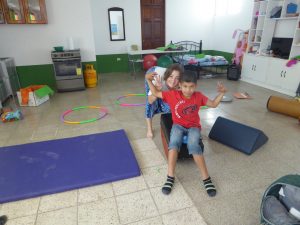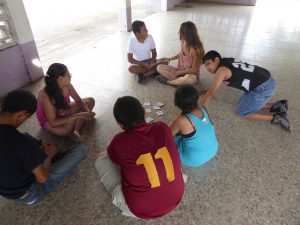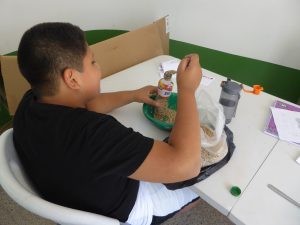En la publicación anterior hicimos una breve introducción a nuestra llegada al Proyecto Corazones Unidos, hoy queremos compartir nuestras experiencias en Ciudad Darío y de cómo trabajamos en la sala de Terapia Ocupacional. Durante tres días a la semana atendemos a niños, niñas, jóvenes y personas adultas con distintas necesidades. Tras haber realizado una evaluación con las familias y las personas que iban a recibir TO, observamos la necesidad existente en relación a la independencia en las actividades de la vida diaria de estas personas seguida de una repetida preocupación de las principales cuidadoras del que pasará cuando no estén para cuidar a dichas personas.
Atendemos a cinco niños con diagnóstico de autismo. Con algunos de ellos lo más importante es buscar el contacto visual a través de un objeto/juego que le llame la atención con el fin de vincularnos con ellos. En cambio con otros estamos descubriendo e investigando nuevos intereses. Intervenimos conjuntamente con las madres, las cuales nos aportan información de cómo poder interactuar con ellos.
La principal necesidad detectada por las madres ha sido poder regular de manera gradual las alteraciones conductuales de sus hijos.
Otra necesidad encontrada, es la falta de lenguaje, por lo que les es difícil comunicarse con ellos. Debido a la petición de las familias, una parte de nuestra intervención se centra en incluir los pictogramas para las rutinas de su vida diaria. Con esto trabajamos el desarrollo de las habilidades lingüísticas, la estructuración espacio-temporal, regulación emocional al poder anticipar los hechos que van a suceder cada día, la simplificación de las secuencias de las actividades básicas de la vida diaria. Todo ello buscando que puedan comunicarse de la mejor manera posible en su entorno.
Dado que hemos observado el interés de varios niños que tienen con la parte artística y los beneficios que tiene a nivel terapéutico. Trabajamos muchas intervenciones basadas en el arte, las manualidades, la creatividad y la expresión libre de cada uno a través de dichas actividades.
En el horario de tardes tenemos dos grupos, uno formado por personas adultas en el que nos plantearon la necesidad de poder sentirse autónomas en las actividades instrumentales de la vida diaria, principalmente con la gestión financiera y la preparación de alimentos. Actualmente trabajamos el manejo del dinero para en posteriores sesiones poder trabajar la movilidad en la comunidad, esto es una característica muy positiva del proyecto ya que tenemos la posibilidad de entrenar en contextos reales. Además disponemos de una cocina donde en las próximas sesiones comenzaremos a trabajar con las actividades relacionadas con la preparación de alimentos.
En el otro grupo, formado por niños y niñas, trabajamos a través del juego las diferentes destrezas motoras y de praxis, sensorio-perceptuales, de regulación emocional, cognitivas,de comunicación y sociales. Todo ello con el objetivo de que puedan adquirir un adecuado desempeño ocupacional en su entorno.
En nuestras sesiones cobran gran importancia las emociones, como nos sentimos en cada momento, aprender a reconocernos y reconocer lo que necesitamos de las demás, brindar apoyo y mostrar las emociones que son apropiadas en cada situación.
Paso a paso seguimos caminando….
In the previous publication, we made a short introduction to our arrival at the Corazones Unidos Project.
Today we want to share our experiences in Ciudad Darío and how we work in the Occupational Therapy clinic. Three days a week we attend children, young people and adults with different needs.
When we arrived to Ciudad Dario, we realized that there is a need of independence in life in people with disability.
First of all, we did an evaluation with the families and the people who were going to receive Ocupational Therapy; we observed that there is a need related to the independence in their lives followed by a repeated concern of the main caretakers of what will happen when not be there to take care of these people.
We attend five children diagnosed with autism. With some of them the most important thing is to seek visual contact through an object or a game that get their attention in order to connect with them.
Though, we are discovering and investigating new interests with other children.
We work together with the mothers, who provide us information about what is the best way to interact with them. The main need detected by mothers has been to gradually regulate the behavioral alterations of their children.
Another need found by patients’ mothers is the lack of the language, because it is difficult to communicate with them. Due to the request of the families, part of our intervention is focus on including the pictograms for daily routine. With this training, we work on the development of linguistic skills, the spatiotemporal structuring, emotional regulation to be able to anticipate the events that are going to happen each day, the simplification of the sequences of the daily basic activities. All of this with the purpose of making their communication with their family and community better.
Since we arrived we could observe the interest of children with the artistic activities. That was the reason why we decided to work in many interventions based on it. Crafts, creativity and the free expression of everyone are many times the center of our activities.
In the afternoon we have two groups, one is formed by adults who need to be able to feel autonomous in daily instrumental activities, mainly with financial management and food preparation. We are currently working on money management so, in further sessions, we can work on moving to the community. This is a very positive characteristic of the project though we have a chance to train in real contexts. We also have a kitchen where we will start to work on activities related on cooking.
In the second group, formed by boys and girls who play games with the purpose of improve different skills, such sensory-perceptual, emotional and cognitive communication and social regulation. All of this work has the aim of being able to have a suitable occupational performance.
In our sessions, emotions become very important, as we feel in each moment, learn to recognize ourselves and recognize what we need from others, provide support and show the emotions that are appropriate in each situation.
Step by step we continue walking…

